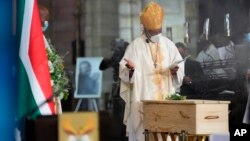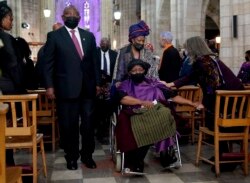The state funeral for Nobel Peace Prize Laureate Archbishop Desmond Tutu has taken place in Cape Town, South Africa, with only 100 mourners allowed inside St. George's Cathedral because of COVID-19 rules. The anti-apartheid hero and human rights activist who died December 26 at the age of 90 had been suffering with prostate cancer.
Desmond Tutu, who was awarded the Nobel Peace Prize in 1984 for his campaign against apartheid, said he wanted the cheapest coffin. And he requsted that money intended for flowers should instead be donated to good causes.
The South African Broadcasting Corporation, airing his funeral Saturday in Cape Town, showed his widow, Leah Tutu, sitting in a wheelchair, listening to the tributes to her famous husband.
There was a televised message from the archbishop of Canterbury, Justin Welby, who said it was like a mouse giving a tribute to an elephant. He said most messages he’s been receiving from people around the world say that when they were in the dark, Desmond Tutu brought light.
“He never ceased to speak prophetically, he never ceased to speak powerfully, he never ceased to shed light. Many Nobel prize winners’ light fades in time, his grew brighter,” he said.
South Africa’s president, Cyril Ramaphosa, gave the eulogy. He said among those Tutu spoke up for were the Palestinians and members of the LGBTQ-plus community.
“One of the causes that was dear to him and less well known to many of us was campaigning together with Her Royal Highness Mable from Organje, who is here with us today, against child marriage across the globe. I have learned how the arch traveled to villages in Ethiopia, in India and Zambia to understand the circumstances under which young girls were being forced into marriage. Such was his stamina. Such was his commitment,” he said.
Ramaphosa credited Tutu with being South Africa’s spiritual father. He said the cleric, along with the country’s first democratically elected president, Nelson Mandela, preached hope and forgiveness.
Tutu chaired the Truth and Reconciliation Commission that sought to heal the victims and perpetrators of apartheid’s atrocities.
He coined the term “Rainbow Nation,” referring to people of all colors who lived in South Africa, and of the beauty that could come after the storm.
In recent years, Tutu was critical of South Africa’s ruling party because of rampant crime and corruption in the country.
Ramaphosa alluded to this, “There are times when he felt let down, and yet, he never lost hope. The most fitting tribute we can pay to him, whoever and wherever we are, is to take up the cause of social justice for which he tirelessly campaigned throughout his life. Archbishop Tutu has left a formidable legacy, and we are enormously diminished by his passing.”
Tutu’s daughter, the Reverend Naomi Tutu, also addressed mourners.
“Many of the messages we’ve received have said, ‘thank you for sharing him with the world.’
“Well, it actually is a two-way street because we shared him with the world. You shared part of the love you held for him, with us. And so, we are thankful, and we are thankful that all of you have gathered in your many places. In person or via the wonders of technology, to be a part of celebrating daddy’s life throughout this week.
“And lastly, to him, who has gathered us here, uDaddy, uTata (Xhosa language for daddy). We say thank you, Daddy, for the many ways you showed us love, for the many times you challenged us. For the many times you comforted us,” she said.
Archbishop Tutu is being cremated in a private ceremony and his ashes will be interred in St. George’s Anglican Cathedral.
He is survived by his wife of 66 years, their four children, and nine grandchildren.






